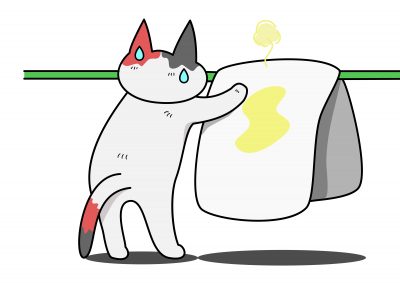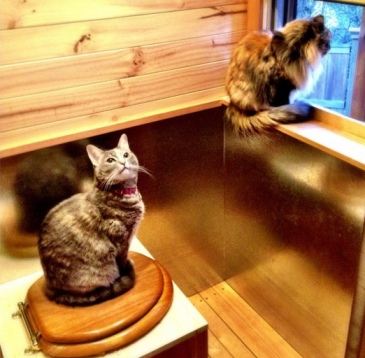
Does your cat visit your bed often to leave its urine on it? Do you want to sleep or take a nap with your kitty but you can’t because he urinates on it every time? There are various causes for this behavior, which could be emotional or medical.
When your cat urinates only on your bed
If your cat only chooses your bed to urinate and doesn’t do it in other places of the house then most likely the cause for this behavior is emotional, often related to separation anxiety when leaving the cat alone too much or stress due to recent routine changes in your cat’s life, such as moving, adding a new pet in the household, or stop playing with your kitty.
Separation Anxiety
The anxiety that pets experience when left alone for long periods of time is not exclusive of cats but also dogs. Canines can even destroy parts of the house or furniture when feeling extremely anxious, chewing on doors or couches in some cases tearing them apart. When felines suffer separation anxiety they hide more, eat less, excess of grooming, follow you everywhere you go, scratch at places they shouldn’t and start urinating or pooping in places they shouldn’t.
When felines urinate on beds is a serious indication of separation anxiety. Your cat associates your scent (and yourself) with the bed. As you leave him alone frequently or for long periods of time when you are at home your cat gets extremely anxious of you leaving again which makes him mark this part of the house the most. By urinating on the bed your cat relieves the stress caused by the separation anxiety. It’s a mark that makes him feel more secure. Some cats urinate on the luggage or other items people use when traveling.
How to Help your cat that misses you so much?
Make sure to create an enriched environment for your cat to enjoy when being alone. Use interactive treat toys to keep your cat entertained. Install multi-level shelves on walls for your cat to jump and walk in high parts of the house, preferably with access to a window where your cat can observe the outside.
When you get home provide your cat quality time, playing with your cat for at least 15-20 minutes non-stop. If your cat is anxious you should play longer, ideally for 25-30 minutes. Playtime is the best way to bond with the kitty and it shows your love for him. Finally, don’t leave your cat alone too much. If you need to travel frequently and be absent for long periods of time, ask a friend to check on your kitty and play with him. Cats not only need food, water and a litter box. They need love and companionship.
What you must never do is punish your cat when you get home and you find your bed with urine or if your kitty pees on your bed right in front of you. This only means your cat misses you and feels alone. If you punish your cat the situation will get worse.

Changes in the Cat’s Life
Urinating on the bed exclusively could be a symptom of high stress in cats. Have you recently moved? Is there a new member in the household, human or pet? Did you stop playing with your kitty? Cats don’t handle changes in their routines very well and they relief their stress by urine marking. If your cat has never urinated on your bed before and it suddenly starts doing it think of a possible change in your cat’s life. Try to keep your cat’s routine the same, this will lower the stress level on your feline. If you got a dog try to keep the dog out of your cat’s food or stop the dog from chasing the cat.
In my article depression in cats I explain the different ways you can make your cat feel better if your feline is suffering stress due to main changes in its routine.

When the cat pees on the bed & other areas of the house
If your cat pees, not only on your bed, but also on the couch, rugs, and in general any part of the house the cause of this could be very complicated to discover. You will have to apply your observing skills to find out what is going on with your kitty. The following are the main causes for this behavior in cats:
Unhappiness with the Litter Box
When cats start litter soiling any part of the house the first thing to examine is the litter box. Is your kitty happy with it? There are various aspects of the litter box that your cat may not like, for example, the location, the size, the type of litter box if top entry, enclosed, etc, the type of litter (especially if your cat is declawed), the cleanliness, the number of litter boxes if multi-cats are using the litter box, and so on. If you think the litter box is the one to blame, check my article why cats don’t use the litter box and how to solve it. This will give you an idea how to make your cat to use the litter box again.
Regarding litter box hygiene, a dirty litter box not only causes the cat to house soiling, but also causes health issues for your kitty and for the household members as well. You may want to check electric self-cleaning cat litter boxes if you don’t have time to clean the cat’s litter box. These units are great to keep up with the litter box so you don’t have to be the “pooper-scooper” anymore. If you don’t know much about automatic litter boxes, read my article types of automatic litter boxes to learn more about different systems and mechanisms.

Territorial Marking
When cats have to live together one of them may develop anxiety and start urinating around the house. To discover which cat is house-soiling you can get prescribed fluorescein from your Vet and give it to the cat you suspect. Its urine will glow blue or green under the ultraviolet light, up to 24 hours. Another solution is using the discarding method by restricting the access to one of your cats to the living areas until you confirm your suspicious.
There are several ways to reduce stress due to territorial conflict in cats. Set up different litter boxes in different rooms, food and water bowls must also be apart in different areas. Install higher shelves on walls for the anxious kitty to jump and stay away from the dominant cat. You can install an electric cat door for the dominant cat to expand its territory, letting the anxious cat to have more space. A good idea is using Feliway pheromones spray in the house to reduce the level of anxiety due to territorial competition.

Health Issues
You must discard health issues when your cat stops using the litter box. Various health diseases, such as UTI (urinary tract infection), kidney disease, arthritis, diabetes, or thyroid issues could lead your cat to do its business outside the litter box. It’s important to determine when it’s time to take your cat to the Vet because delaying the visit could result in worse consequences for your cat. Getting your cat checked by a Vet is always the safest approach, especially if your kitty shows signs of being sick, such as fatigue, meowing more often, and hiding most of the time.
Cleaning thoroughly
You must clean the soiled areas with a good enzyme-destroyer, such as the Nature’s Miracle. I have used this product with excellent results in the past. My cat started to having litter box accidents due to her catnip consumption (you may be surprised with the effects of the catnip in the cat’s elimination habits). The Nature’s Miracle product removes the smell totally and discourages your cat from using that spot again. Don’t use ammonia-based products because they may attract your cat to use that spot again.
9 tips to stop it
Together with eliminating the causes for your cat to house-soiling and after cleaning thoroughly those spots, you need to make those places less appealing for your cat:
- You can put a motion-activated bright light next to your bed. This will discourage your cat from using the bed as a litter box. Cats don’t like changes when ready to urine marking or peeing.
- If your cat is the type that hates plastic noises, you can use a folded blanket and put crinkle material plastic film inside, sewing the blanket with it in it. The plastic noise will deter your cat from jumping onto your bed. You can find this type of plastic film on Amazon. Check here.
- If there is a plant close to where your cat is urinating, move the plant to a different location, ideally, higher where your cat can’t access.
- Put an object that obstruct your cat access to the area where it is urinating.
- Put double sided tapes in the parts of the floor where your cat is marking. This will make your kitty to avoid getting its paws sticky.
- Put a litter box right on top of where your cat is soiling. This will encourage your kitty to use the litter box instead.
- Place the food bowl right where your cat is urinating. This will discourage your cat from urinating in that spot. Cats don’t like to eat where they urinate.
- Stop placing catnip stuffed toys around the floor and stop feeding your cat catnip in your house. Check if this urinating behavior stops.
- Put an automatic air spray deterrent such as the PetSafe SSSCAT close to the area where your cat urinates, the couch, bed, floors, etc. Check one of these devices here.
Finding the cause and a solution from your cat urinating on your bed could be a challenge. But remember that the cat’s urine it’s a way of communication and it should be consider as such. Remembers that this problem could also be a cause of a health issue in your feline friend, which must be addressed promptly.
Ugh, no thing in my life has caused me such an extensive amount a headache as the smell of feline pee in my home consistently…
A while ago when I was living alone, I used to have serious issues. You could never accept every one of the things my felines took a piss on!
One of my 2 felines (both neutered guys) had taken to painting the majority of my dividers, furniture, and whatever else he could reach. I was appalled when I got an UV light. He never did that in the majority of the 9 years I’ve had him and didn’t when I got him a mate (they adore one another and did so immediately) yet when a bizarre dark feline fired appearing outside both of my felines went crazy and the more established one (9) began his divider painting, just as the drapes out in the kitty room. I couldn’t stay aware of it.
My felines are indoor felines so dislike the stray is really going to get in here yet the two of them abhor him (and he is weird…my neighbor’s felines detest him as well). I’ve had a go at cleaning with a pet pee protein and afterward splashing some “No More Spraying” however that hasn’t worked. He’s a tricky little bugger as well; he holds up until he believes I’m not looking and after that does it. He’s discovered that the moment I see him backing his butt planning some mischief he gets shouted at.
It wasn’t until I found “NoMoreCatPee.com” that I had the option to at last dispose of this tedious conduct.
Presently my home doesn’t smell like a litter box any longer :)
I’ve set a link to their site in my name in the event that anybody is intrigued…
Cheers!
Stefan